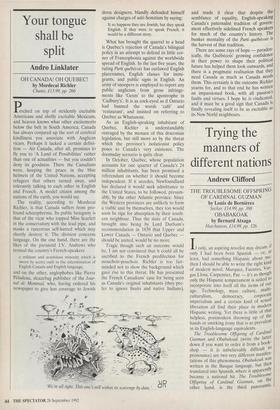Your tongue shall be split
Andro Linklater
OH CANADA! OH QUEBEC! by Mordecai Richler Chatto, £13.99, pp. 266
The reality, according to Mordecai Richler, is that Canada suffers from pro- found schizophrenia. Its public benignity is that of the vicar who topped Miss Scarlett in the conservatory with the lead pipe, and masks a rancorous self-hatred which may shortly destroy it. The division concerns language. On the one hand, there are the likes of the paranoid J.V. Andrews who termed the country's French-speakers
a militant and avaricious minority which is sworn by secret oath to the extermination of English Canada and English language,
and on the other, anglophobes like Pierre Peladeau, sleazebag publisher of the Jour- nal de Montreal, who, having ordered his newspaper to give less coverage to Jewish
dress designers, blandly defended himself against charges of anti-Semitism by saying:
It so happens they are Jewish, but they speak English. If they were to speak French, it would be a different story.
What has brought the quarrel to a head is Quebec's rejection of Canada's bilingual policy in an attempt to defend its little cor- ner of Francophonia against the worldwide spread of English. In the last five years, the ruling Parti quebecois has outlawed English placenames, English classes for immi- grants, and public signs in English. An army of snoopers is employed to report any public anglicism from gross infringe- ments like 'Gents' to the apostrophe in 'Cadbury's'. It is as cock-eyed as if Ontario had banned the words 'café' and 'restaurant', and insisted on referring to Quebec as Whatanose.
As an English-speaking inhabitant of Quebec, Richler is understandably outraged by the menace of this draconian legislation, but still more so by the threat which the province's isolationist policy poses to Canada's very existence. The doomsday scenario is quite clear.
In October, Quebec, whose population accounts for one quarter of Canada's 24 million inhabitants, has been promised a referendum on whether it should become independent. If it secedes, Newfoundland has declared it would seek admittance to the United States, to be followed, presum- ably, by the other Atlantic province. Since the Western provinces are unlikely to form a viable unit by themselves, they too would soon be ripe for absorption by their south- ern neighbour. Thus the state of Canada, brought into being by Lord Durham's recommendation in 1839 that Upper and Lower Canada — Ontario and Quebec should be united, would be no more.
Tragic though such an outcome would be, I am not convinced that it could all be ascribed to the French predilection for mouchoir-pouchoir. Richter is too fair- minded not to show the background which gave rise to this threat. He has presented the French Canadians' case for being seen as Canada's original inhabitants (they pre- fer to ignore Inuits and native Indians), 'We're all right. This one's still within its scavenge by date. and made it clear that despite the semblance of equality, English-speaking Canada's paternalist tradition of govern- ment effectively sidelined French speakers for much of the country's history. The bunker mentality of the Parti quebecois is the harvest of that tradition.
There are some rays of hope — paradox- ically, the Quebecois' growing confidence in their power to shape their political future has helped them look outwards, and there is a pragmatic realisation that they need Canada as much as Canada needs them. This certainly is the outcome Richler yearns for, and to that end he has written an impassioned book, with all passion's faults and virtues. I hope he is vindicated, and it must be a good sign that Canada is finally revealing itself to be as excitable as its New Norld neighbours.


































































 Previous page
Previous page